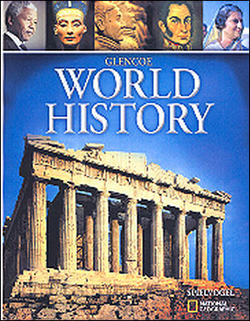 |
| 1 |  | 
The Triple Alliance consisted of which of these?
|
|  | A) | Germany, Austria, and Hungary |
|  | B) | France, Great Britain, and Russia |
|  | C) | Germany, Austria-Hungary, and Italy |
|  | D) | Austria, Hungary, and Serbia |
|
|
 |
| 2 |  | 
Which of the following did NOT contribute to the start of World War I?
|
|  | A) | the growth of militarism |
|  | B) | the nationalist aspirations of Slavic minorities |
|  | C) | Germany's "blank check" to Austria-Hungary during the Balkan crisis |
|  | D) | lack of military planning by the European powers |
|
|
 |
| 3 |  | 
What triggered the outbreak of events that led to World War I?
|
|  | A) | The czar ordered full mobilization of the Russian army. |
|  | B) | Austria-Hungary declared war on Serbia. |
|  | C) | Germany declared war on Russia. |
|  | D) | Archduke Francis Ferdinand was assassinated in Sarajevo. |
|
|
 |
| 4 |  | 
Military leaders were not prepared for the trench warfare of World War I, in which _____.
|
|  | A) | troops moved quickly through trenches to capture territory |
|  | B) | machine gun fire caused few casualities in the trenches |
|  | C) | opposing forces fought without much loss or gain of land |
|  | D) | forces moved quickly with tanks and artillery |
|
|
 |
| 5 |  | 
What convinced the United States to enter world War I?
|
|  | A) | the stalemate in France |
|  | B) | Japan's entry into the war |
|  | C) | the blockade of Great Britain |
|  | D) | Germany's use of unrestricted submarine warfare |
|
|
 |
| 6 |  | 
During World War I, Britain's Defense of the Realm Act expanded the government's power to _____.
|
|  | A) | control the national economy |
|  | B) | arrest protestors as traitors |
|  | C) | halt the censorship of newspapers |
|  | D) | institute conscription |
|
|
 |
| 7 |  | 
Which of the following occurred right after the collapse of the czarist regime in Russia?
|
|  | A) | Alexandra Romanov took over major government decision making. |
|  | B) | Aleksandr Kerensky headed a provisional government. |
|  | C) | The Bolsheviks took control of the government. |
|  | D) | Some 10,000 women marched in Petrograd demanding "Peace and Bread." |
|
|
 |
| 8 |  | 
The Bolsheviks, who came to power under the leadership of V.I. Lenin, _____.
|
|  | A) | believed in passive resistance |
|  | B) | supported the Kerensky provisional government |
|  | C) | began as a small faction of the Russian Social Democrats |
|  | D) | overthrew the provisional government in a bloody battle |
|
|
 |
| 9 |  | 
Why did the final German offensive of World War I fail?
|
|  | A) | The Russians reopened the Eastern Front. |
|  | B) | The Allies, with 140,000 fresh American troops, stopped the German advance. |
|  | C) | The mutiny of sailors in Kiel led to the overthrow of the German government. |
|  | D) | The offensive led the United States to enter the war. |
|
|
 |
| 10 |  | 
Which of the following did NOT happen immediately after the end of World War I?
|
|  | A) | Emperor William II became a figurehead of Germany without political power. |
|  | B) | The Austro-Hungarian Empire dissolved. |
|  | C) | The new monarchical state of Yugoslavia was established. |
|  | D) | Communist forces tried to seize power in Germany. |
|
|
















